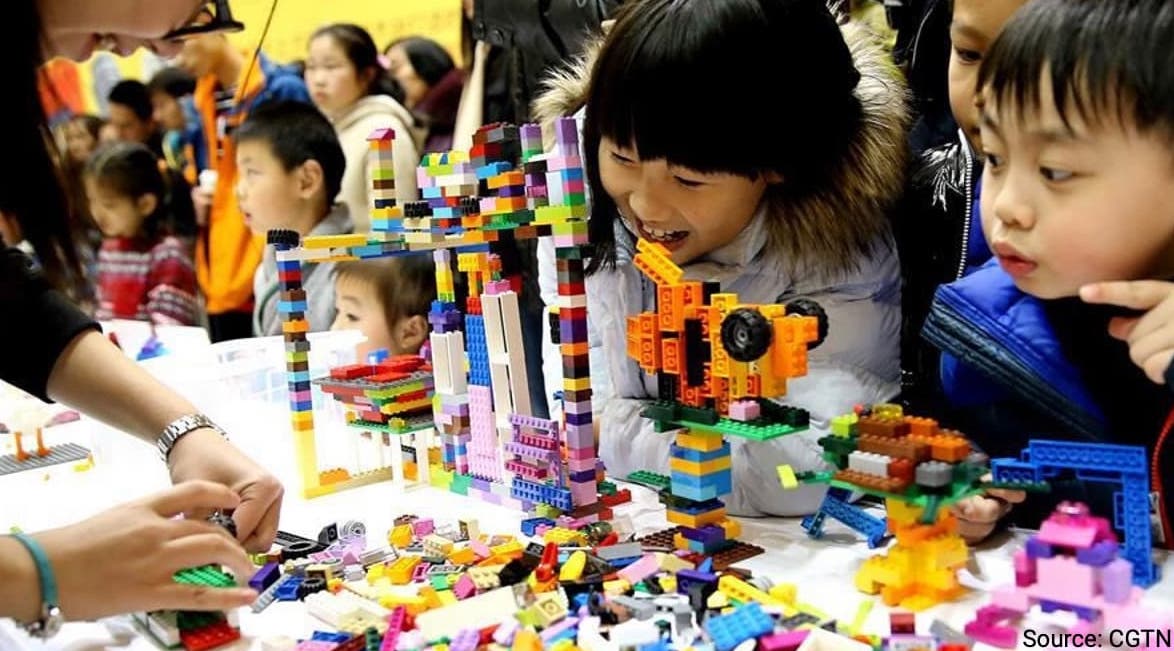Since its introduction to the Chinese market, LEGO Education has played a pivotal role in revolutionizing how students engage with STEAM (Science, Technology, Engineering, Arts, and Mathematics) concepts. Benefiting from the governmental endorsement of STEAM education, LEGO Education has made its way into classrooms. The company has opened learning centers, which have withstood the crackdown on the tutoring industry of 2021. Despite facing competition within the STEAM education sector, LEGO Education remains popular in China. It focuses on fostering enthusiasm among Chinese students to showcase their STEAM abilities in international competitions.
STEAM Education in China
The introduction of STEAM education to China in 2014 sparked a nationwide interest in innovative learning approaches. The STEAM education market in China witnessed remarkable growth, reaching RMB 42.2 billion in 2021, with robot programming emerging as a dominant segment (61%). It is estimated that in 2023, the market will reach RMB 58.1 billion.
Main players in China’s STEAM education market
Amidst this growth, LEGO Education faces competition from players such as Makeblock, Xiaomawang, and Mad Science. These competitors each offer unique educational solutions in the STEAM space.
Makeblock (童心制物), headquartered in Shenzhen, specializes in producing a wide range of robot hardware, software, and educational content, to foster the scientific and innovative abilities of children and even university students. Similar to LEGO Education, its products are used in classrooms, but some of them are also targeted towards household use.
Xiaomawang (小马王) is a notable contender in the Chinese STEAM market. The brand specializes in teaching programming languages like Python and C++, as well as APP creation. Xiaomawang currently owns over 80 learning centers spread across 20 cities in China.
Mad Science, from Canada, expanded into China in 2013 through the establishment of learning centers and integration into school programs. Unlike its competitors in the STEAM market, Mad Science prioritizes teaching children various scientific disciplines including chemistry, physics, engineering, and biology. Through its hands-on approach, Mad Science aims to spark curiosity about the natural world among children.
| Main players | LEGO Education | Makeblock | Xiaomawang | Mad Science |
| Specialization | Intelligent hardware, programming, robotics, teaching content | Programming | Chemistry, physics, biology, engineering | |
| Age range | Kindergarten to middle school | Kindergarten to university students | Kindergarten to high school | Kindergarten to middle school |
| Learning centers | Yes | Yes | Yes | Yes |
| Target | In-class, learning centers | In-class, learning centers, at home | Learning centers, at home | Learning centers, in-class |
| Geographical location (learning centers) | First and new-first tier cities | First, new-first and second tier cities | ||
| Price range (learning centers) | RMB 84.5 per class | RMB 90 per class | RMB 22 per class | RMB 99.7 per class |
| Price range (learning kits) | RMB 879-7,559 | RMB 99-2,349 | N/A | |
The Chinese government encourages STEAM education
While there is not a specific nationwide policy in place, the Chinese government has been actively encouraging initiatives to promote STEAM education as a modern teaching approach. An example of this is the “13th Five-Year Plan for Educational Informatization”, issued by the Ministry of Education in 2016. This plan emphasizes the importance of STEAM education to create well-rounded students and to develop high-quality talents.
Private tutoring crackdown
In 2021, the Chinese government introduced strict regulations aimed at curbing the private tutoring industry. This move was aimed at alleviating pressure on children and reducing family expenses to boost the country’s birth rate. According to the new regulations, for-profit companies are prohibited from providing tutoring services in core curriculum subjects whilst foreign investment in such companies is also banned. The announcement stated that no new licenses would be granted, and all existing tutoring companies must re-register as non-profit organizations.
The new policy barely affected non-academic extracurricular activities. These activities are separate from the core curriculum subjects like Chinese literature, math, English, physics, chemistry, biology, geography, history, and sociology. LEGO Education, which does not offer core curriculum tutoring, was therefore not affected by the policy.
Overview of LEGO Education in China
During the China International Import Expo in November 2018, the Lego Group introduced its inaugural STEAM courses designed specifically for Chinese students. This effort was geared towards providing local students with vital 21st-century skills through creative play. Lego Education has developed the STEAM courses collaboratively with East China Normal University Press and Chinese STEAM experts. The STEAM courses were first tested in primary schools in Shanghai. Following the testings, courses were officially released in April 2019. This marked a milestone in the advancement of STEAM education in China.
In-class integration of LEGO Education
LEGO Education’s offerings cater to students from pre-kindergarten to middle school, aligning with Chinese national curriculum standards. Collaborating closely with China’s Ministry of Education, LEGO Education has developed an “innovative talents training program” involving over 10,000 teachers annually. This program aims to enhance teaching methodologies using LEGO Education in the classroom.
The class kits sold by LEGO Education are primarily designed to alleviate the stress of traditional learning, thereby promoting a more engaging educational experience. According to the global president of LEGO Education, findings from the company’s survey reveal that more than 90% of Chinese parents feel that their children are stressed by school. Additionally, over 85% of teachers acknowledge that their students are experiencing low self-confidence because of academic pressure.
Every LEGO Education product tailored for classroom use is a comprehensive package encompassing various themes. For instance, the “Spike Scientific Innovation Set,” which offers more than 100 hours of learning content, includes over 400 LEGO pieces, motors, sensors, and a user-friendly programming app designed to engage elementary school students. Students work in pairs on the sets to learn basic programming concepts by having fun.
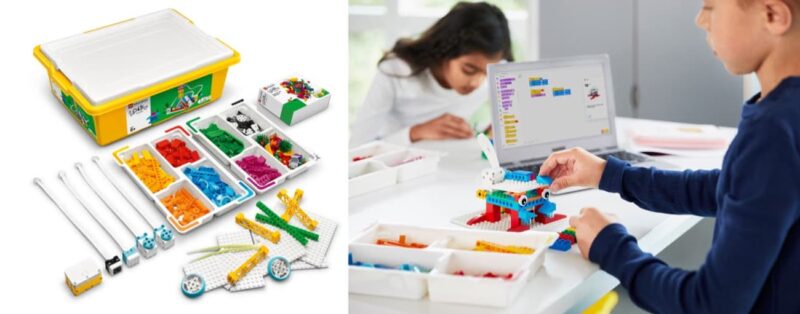
LEGO Education has strategically partnered with four distributors in Mainland China, along with two in Taiwan and one in Hong Kong. These distributors play a crucial role in organizing workshops, demonstrations, and teacher training sessions to facilitate the seamless integration of LEGO Education into classrooms across the region.
Outside the classroom
Despite STEAM education making its way into the classroom, it has predominantly been associated with off-campus programs in China. In response, LEGO Education has opened learning centers, aiming to provide additional learning opportunities to kids. Although some faced challenges and closed doors due to contract disputes, the overall trend has been positive, with a total of 140 centers in 2019. This expansion reflects the demand among Chinese parents to provide their children with a competitive edge from a young age. As of March 2024, LEGO Education learning centers are still operational, indicating that they have not been impacted by the tutoring crackdown. The comments on the review platform Dazhongdianping (大众点评) are very positive. Most of the netizens emphasized the patience of the educators and the engaging content.
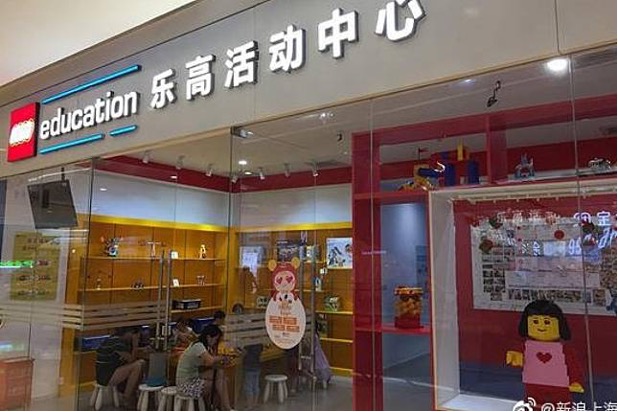
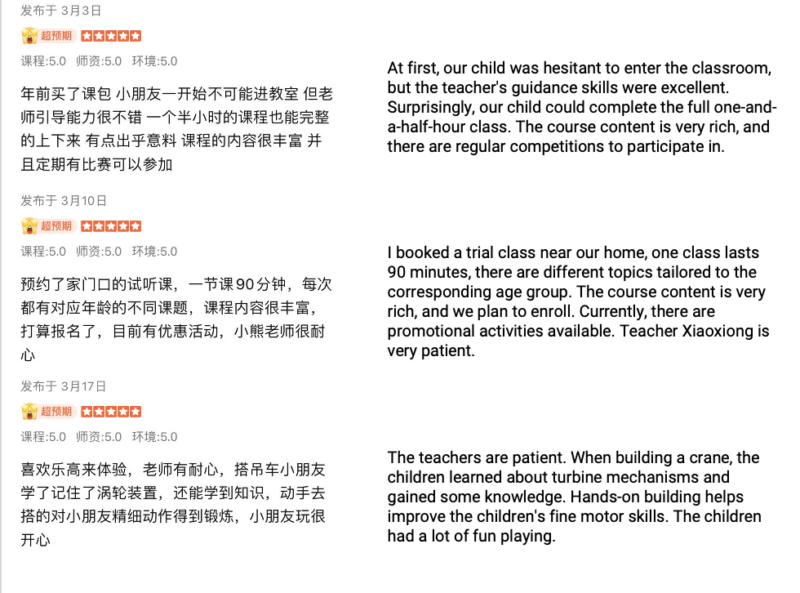
International competitions
Participation in international competitions has played an important role in showcasing the prowess of Chinese students in STEAM education. Notably, Chinese teams have excelled in events such as robot olympiads and the FIRST LEGO League (FLL) World Festival, where they have demonstrated innovative problem-solving skills and creativity using LEGO Education resources. In the latter event, hosted in April 2023 in the US, Chinese students worked on wind and solar themes, and one team won an award.
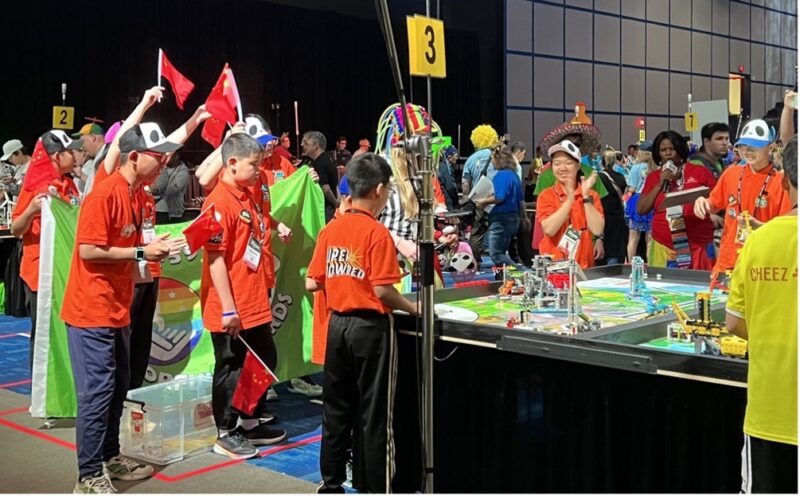
LEGO Education in China: a strong player in the developing STEAM market
- The Chinese STEAM education market has experienced rapid growth, reaching RMB 42.2 billion in 2021.
- LEGO Education has played a significant role in transforming STEAM education in China. It managed to benefit from governmental support and maintain popularity despite competition.
- LEGO Education’s integration into Chinese classrooms aligns with national curriculum standards. It also aims to alleviate academic stress while providing engaging learning experiences.
- Outside the classroom, LEGO Education has expanded its presence through learning centers. Despite contract disputes, with positive feedback from parents.
- Chinese students have demonstrated excellence in international STEAM competitions, showcasing their innovative problem-solving skills using LEGO Education resources.


